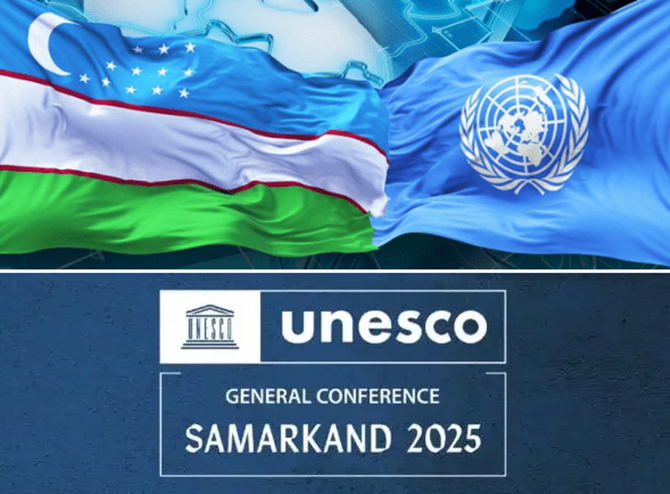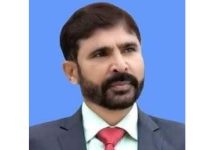Minister of Higher Education, Science and Innovation of the Republic of Uzbekistan
By Kongratbay Sharipov
Today, Uzbekistan continues to steadily strengthen its cooperation with the international community in education, science, culture, and innovation. In this process, the country’s partnership with UNESCO holds a special place.
Uzbekistan became a member of UNESCO in 1993 – a historic step that paved the way for integrating the national education system, scientific potential, and rich cultural heritage into the global intellectual space.
The opening of the UNESCO Office in Tashkent in 1996 marked a new milestone in bilateral relations. Moreover, the National Commission of the Republic of Uzbekistan for UNESCO was established to ensure sustainable cooperation, which has since become an active platform for dialogue and partnership.
Throughout this collaboration, Uzbekistan has consistently implemented international norms and principles in education, science, and sports. One of the important steps in this direction was the ratification, in 1997, of the 1960 Convention against Discrimination in Education, aimed at promoting equality and fairness in the education system. In the same year, Uzbekistan also acceded to the 1989 Convention on Technical and Vocational Education, which contributed to expanding opportunities for young people to acquire modern professions and practical skills, linking education closely with real life.
These measures have played a key role in strengthening Uzbekistan’s position in the global educational space and demonstrate the country’s firm commitment to promoting human capital development. By joining these conventions, Uzbekistan reaffirmed its dedication to equality and quality in education, youth health and well-being, and to aligning vocational education with international standards.
The Global Convention on the Recognition of Qualifications in Higher Education
At present, Uzbekistan is taking practical steps toward joining UNESCO’s Global Convention on the Recognition of Qualifications concerning Higher Education. This document aims to harmonize international education systems, ensure mutual recognition of diplomas and qualifications, and expand academic and scientific mobility. The initiative will help make Uzbekistan’s higher education system more open and competitive globally, enhance cooperation with foreign universities, and improve the international employability of Uzbek graduates.
On December 10, 2021, Tashkent hosted a High-Level Meeting of Experts on Strengthening Stakeholder Cooperation for the Adoption and Implementation of the Global Convention on the Recognition of Qualifications. National and international experts, government representatives, and higher education institutions discussed the significance of Uzbekistan’s accession to the convention as a key step in integrating the national higher education system into the global academic space.
UNESCO Chairs in Uzbekistan
One of the most effective areas of cooperation between Uzbekistan and UNESCO is the establishment and activity of UNESCO Chairs. Currently, there are nine UNESCO Chairs operating at higher education institutions across the country. Each of them contributes to strengthening international cooperation in education, science, culture, communication, and information, as well as to advancing research potential and promoting the principles of sustainable development.
UNESCO Chairs are established under the UNITWIN (University Twinning and Networking) Programme, launched in 1992 to encourage the exchange of experience and knowledge among universities and to expand global academic cooperation. Today, the network brings together over 700 chairs and research centers in 114 countries around the world.
In most cases, the activities of UNESCO Chairs are financed directly by the universities themselves – reflecting their aspiration to enhance academic prestige and to operate in close cooperation with the international scientific community.
A vivid example of such cooperation is the UNESCO Chair in Education for Sustainable Development at Urgench State University. The Chair has organized more than 20 events involving teachers, researchers, students, NGOs, and international experts. It has also held conferences, launched student exchange programmes, and published joint research papers. Such initiatives not only strengthen the capacity of the national education system but also promote Uzbekistan’s integration into the global scientific and intellectual community.
Rural Development and Human Potential: Supported by UNESCO and the European Union
Uzbekistan is steadily advancing international cooperation in promoting rural development, youth employment, and the enhancement of modern professional skills. A vivid example of this is the project “Development of Employment Skills in Rural Areas of Uzbekistan,” funded by the European Union and implemented by the UNESCO Office in Tashkent.
The six-year project (2020–2026), with a total budget of €9.6 million, is a clear reflection of the strong partnership between the European Union and UNESCO in supporting education reforms in Uzbekistan. The main goal of the initiative is to ensure sustainable economic growth by training specialists equipped with up-to-date knowledge and skills that meet the needs of the rural labor market.
Within the project, Uzbekistan’s agricultural education system is undergoing major modernization. Specialists are being trained in such forward-looking fields as intensive horticulture, greenhouse management, agricultural product processing and storage, water management and land reclamation, and the operation of water-saving irrigation systems, all oriented toward practical skills demanded by the modern labor market.
A significant component of the project is the development of a National Vocational Education Strategy, new occupational standards, and educational programmes in agriculture and water management. In addition, pilot educational institutions are being equipped with modern laboratories, learning facilities, and teaching technologies.
Four pilot colleges in Qorovulbozor, Qo‘shko‘pir, G‘ijduvon, and Qizirik have been selected to implement the project. They have received modern tractors, technical equipment, computers, and refrigeration units for agricultural product storage. Moreover, four Advanced Vocational Training Centers are being renovated and equipped with up-to-date facilities.
During implementation, the rural labor market was analyzed to assess demand for mid-level specialists. Based on the results, six pilot specializations, including Automated Water Management Systems Technician, Animal Husbandry, Greenhouse Management, Irrigated Land Reclamation, Crop Science, and Farm Management, were introduced, and student admissions began in the 2023/2024 academic year.
In May 2024, an international conference titled “National Frameworks for Quality Assurance” was held within the project, focusing on aligning Uzbekistan’s vocational education system with international quality standards and strengthening human capital.
Additionally, under UNESCO’s “Delta Framework” programme, national ICT competencies are being developed, and special training courses for teachers of pilot institutions are planned.
This initiative serves not only to modernize the vocational education system but also to foster sustainable rural development, enhance youth employability, and improve the quality of life in local communities.
Science and Innovation for a Peaceful and Sustainable Future
In recent years, Uzbekistan has witnessed growing enthusiasm for new scientific ideas, research, and innovation. A shining example of this is the “InnoWeek.Uz” International Week of Innovative Ideas, held annually since 2018. Each year, the event provides a unique platform for bridging science and practice, engaging young researchers in innovation, and expanding global scientific cooperation.
“InnoWeek.Uz” has become a true celebration of creativity, discovery, and technological advancement, a space where scientific potential, imagination, and passion for progress converge. Creating the future through research and innovation, and opening new paths to development through knowledge, lies at the heart of this initiative.
The “InnoWeek.Uz–2024” edition marked a new milestone, featuring the “Science & Innovation for a Peaceful and Sustainable Future” Forum organized under the auspices of UNESCO. The forum brought together young scientists, researchers, and experts from around the world to exchange views on the role of science and innovation in promoting peace and sustainable development. The participants shared their research achievements and discussed new opportunities for global collaboration in science and technology.
Through their work, young scientists inspired others by seeking solutions to modern challenges, developing technologies that serve human welfare, and advancing harmony between nature and society. Discussions at the forum highlighted the role of innovation in economic and social progress, the contribution of science to peacebuilding, and the prospects for future scientific cooperation.
All these initiatives implemented in cooperation with UNESCO deepen Uzbekistan’s ongoing reforms in education, science, and culture, while strengthening the country’s ties with the global community.
Today, knowledge and creativity, tradition and innovation, national values and modern approaches unite in Uzbekistan with one shared goal – progress and a sustainable future.
As UNESCO’s noble motto proclaims, “Building peace through education, science and culture” – this principle embodies both the moral and practical essence of Uzbekistan’s policy today. The nation continues to move forward with determination, fostering peace, development, and prosperity through enlightenment and science.

















